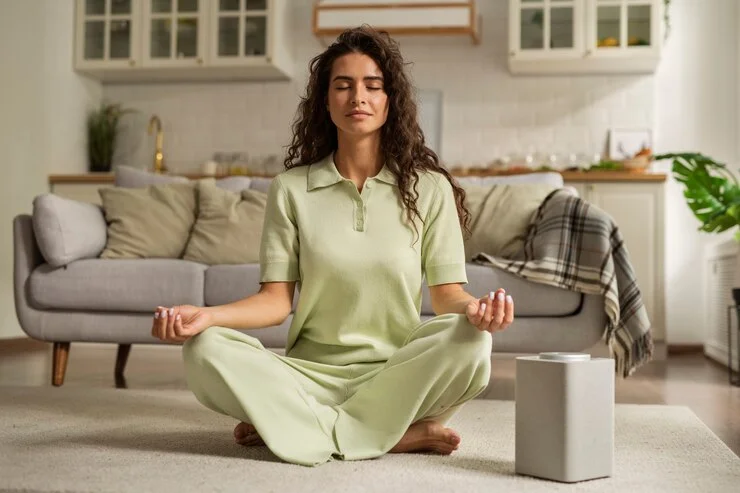11 Effective Ways To Reduce Stress and Achieve Calm
Stress is an unavoidable part of life that we all experience. Ongoing stress takes a toll on both physical and mental health if left unchecked. Learning stress management strategies is critical for your overall wellbeing.
In this post, I’ll share 11 techniques that I’ve personally found effective for reducing feelings of stress and anxiety to achieve a calmer state of mind.
1. Practice Deep Breathing
One of the fastest ways to trigger your body’s natural relaxation response is through deep breathing exercises. Simply taking slow, deep breaths signals your nervous system that there’s no threat present and it can move out of “fight-or-flight” mode.
Try this exercise whenever you notice stress building: Inhale deeply and slowly through your nose, allowing your belly to expand as your lungs fill completely. Exhale just as slowly out through your mouth, emptying your lungs. Repeat for 2-5 minutes. Focus on making inhales and exhales smooth and consistent.
Deep breathing alone can induce rapid relaxation by lowering your heart rate and blood pressure.
2. Meditate
Consistent meditation practice has been shown to reduce anxiety, improve focus, and help manage the pressures of daily life. I try to meditate for 10-15 minutes twice a day using the Calm app for guided sessions.
If you’re new to it, start with just 5 minutes of focusing on your breath and dismissing distracting thoughts. Over time, you’ll get better at entering a tranquil state through meditation. But even short sessions confer powerful stress relief benefits.
3. Exercise Regularly
Making time for physical activity is vital for stress management. Aerobic exercise releases endorphins which counteract stress hormones like cortisol. I always feel less tense after working out.
Don’t think you need intense sweat sessions though. Even light exercise like walking helps dissipate stress. Aim for at least 30 mins of activity 3-4 days per week. I often take a short walk midday which boosts my focus.
4. Spend Time in Nature
Being outdoors surrounded by nature has wide-ranging benefits, including lowered blood pressure, heart rate, and stress hormone levels. It could be as simple as sitting outdoors for lunch or taking walks through a park.
I also recommend “grounding” yourself by walking barefoot on grass, dirt trails, or sand. Visualize the negative energy seeping out of you into the earth. Even having houseplants or natural sunlight helps create calming environments.
5. Listen to Relaxing Music
Soothing music has remarkable effects on mood through brain pathways related to stress, breath rate, heart rate, and blood pressure. I have playlists set up to use at different times for unwinding.
Try ambient, instrumental pieces or nature sounds like ocean waves, rainfall, or forest sounds. Use these auditory relaxation tools daily whenever you need to find your zen. Having them on in the background while working also diminishes stress.
6. Adopt Healthy Sleep Habits
Not getting adequate, quality sleep negatively impacts your ability to handle stress. Prioritize setting a consistent sleep schedule and stick to it. Power down digital devices at least an hour before bedtime.
Practice other sleep hygiene habits like avoiding alcohol before bed, limiting caffeine past 2pm, and making your room cool, dark and quiet. Invest in a comfortable mattress and bedding to set the stage for restful sleep.
7. Avoid Caffeine Late in Day
Consuming caffeine close to bedtime spikes cortisol production which interferes with sleep. I abstain from any caffeine past 2pm, swapping my afternoon coffee for decaf tea instead. This prevents insomnia-induced stress.
Limit coffee, black tea, soda, and energy drinks later in the day. Herbal caffeine-free teas like chamomile and peppermint are soothing drinks before bed. Getting quality sleep makes controlling stress much easier.
8. Massage and Acupuncture
Massage therapy enhances stress relief on physical and psychological levels. Kneading tense muscles releases oxytocin while lowering cortisol. Regular massages help keep levels of the stress hormone in check.
Acupuncture can also help chronic stress by triggering deep relaxation. The tiny needles tap into key nervous system points inducing the “rest and digest” parasympathetic response. I try to get a massage or acupuncture treatment each month.
9. Laugh and Use Humor
Laughter really is good medicine when it comes to buffering against stress. Watch a funny show, hang out with friends who make you laugh, go to a comedy club – make more room for humor and levity in your life.
Even forcing a laugh can lighten your mood due to brain chemistry shifts and help reframe stressful situations. Laughter strengthens immune functioning and promotes overall wellbeing.
10. Practice Gratitude
Focusing on the positive parts of life through gratitude has been proven to reduce stress and improve mental health. I make it a daily habit to list 5-10 things I’m grateful for or tell my partner something I appreciate about them.
Gratitude could also mean thanking someone who helped you, acknowledging a pleasant experience that day, or feeling grateful for your health. This outlook wards off negative thought patterns.
11. Socialize and Get Support
Don’t underestimate the value of spending time with loved ones to keep stress from spiraling out of control. Share what’s worrying you and lean on your social circles for perspective and reassurance. Staying connected combats loneliness-induced stress.
Surround yourself with positive influences who enrich your life. Make comfort foods and share meals together. Getting support and affection from those closest to you acts like a shield against stressors.
The key is consistency with using these strategies, even when you’re not feeling particularly stressed. They’ll help establish healthy lifelong habits for ongoing stress management. Reduce the sources of stress within your control and employ science-backed techniques like these to handle the rest.


